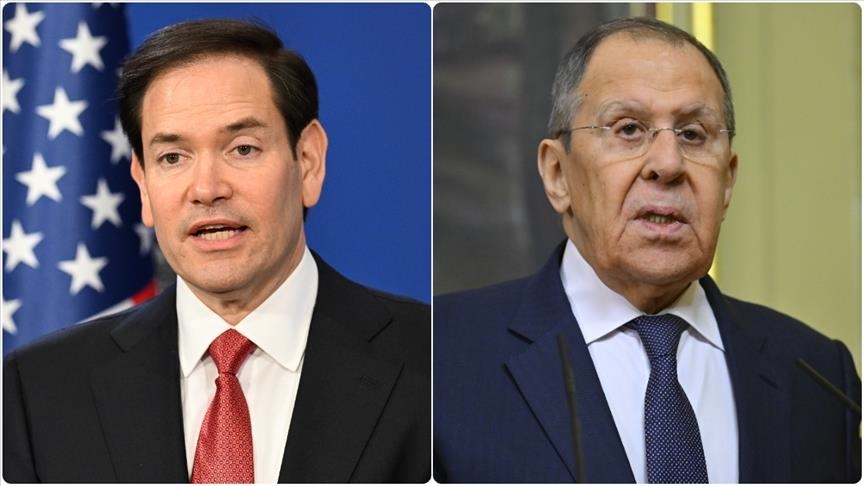Rubio and Lavrov Clash at UN as NATO Tensions Escalate
U.S. Secretary Rubio clashed with Russia's Lavrov at the UN, demanding an end to the "killing" in Ukraine. The exchange followed President Zelensky's speech questioning NATO's security guarantees and warning of Russian aggression.

Erbil (Kurdistan24) – U.S. Secretary of State Marco Rubio issued a stark call Wednesday for Russia to end what he described as the “killing” in Ukraine, in a blunt exchange with Russian Foreign Minister Sergey Lavrov that underscored Washington’s hardening stance toward Moscow. The clash in rhetoric came as Ukrainian President Volodymyr Zelensky used the UN General Assembly platform to question NATO’s security guarantees and sound the alarm over widening Russian aggression across Europe.
According to State Department spokesman Tommy Pigott, Rubio “reiterated President Donald Trump’s call for the killing to stop and the need for Moscow to take meaningful steps toward a durable resolution of the Russia-Ukraine war.” Lavrov, in a sharply worded reply, dismissed Kyiv’s Western-backed peace initiatives, calling them “schemes promoted by European capitals aimed at prolonging the conflict,” in a readout released by Moscow.
The exchange came less than twenty-four hours after Trump shifted his own stance on the war, asserting that Ukraine could not only regain its territory but could “maybe even go further.” The reversal marked an extraordinary change after months of downplaying Kyiv’s prospects of restoring its occupied lands.
Addressing the UN General Assembly, Zelensky cast doubt on NATO’s ability to guarantee Ukraine’s security, arguing that “international institutions are too weak” to protect nations from modern threats. “Even being part of a long-standing military alliance doesn’t automatically mean you are safe,” he declared.
Zelensky confirmed he had held a “good meeting” with Trump in New York, contrasting it with a tense White House encounter earlier this year. While Trump has ruled out NATO membership for Kyiv, the Ukrainian leader said he remains hopeful that U.S. support, alongside European assistance, will bolster Ukraine’s defense.
In his speech, Zelensky broadened his warnings beyond Ukraine, arguing that Europe cannot afford to lose strategically vital Moldova to Russian influence. “We have already lost Georgia in Europe, and for many years Belarus has moved into dependence on Russia. Europe cannot afford to lose Moldova too,” he cautioned.
The warning comes just days before Moldovan voters head to the polls, with pro-EU President Maia Sandu facing an onslaught of Russian-linked disinformation campaigns, including deepfake videos. Zelensky compared Moscow’s tactics in Moldova to Iran’s influence in Lebanon, warning of a creeping destabilization strategy.
The Ukrainian leader also raised alarms over the evolving arms race, highlighting the rise of autonomous drones and artificial intelligence-driven weapons. “We are now living through the most destructive arms race in human history, because this time it includes artificial intelligence,” Zelensky said, emphasizing that the only real security guarantee available is “friends and weapons.”
He noted that Ukraine, forced by necessity, has developed long-range drones capable of flying thousands of kilometers, underscoring their role in defending the nation in the absence of larger missile systems. “We had no choice but to build them to protect our right to life,” he said.
Rubio’s remarks and Zelensky’s appeals came against the backdrop of heightened NATO anxiety following Russia’s latest violation of alliance airspace. On September 20, three Russian fighter jets penetrated Estonian airspace for twelve minutes in what Tallinn described as an “unprecedentedly brazen provocation.”
European leaders condemned the incursion as a dangerous escalation, with Estonia’s president warning that NATO air defense must become a top priority. Germany’s foreign minister pledged “full solidarity” with Estonia, while the European Union labeled the violation “unacceptable.” Moscow denied the allegations, claiming its jets flew only over neutral waters of the Baltic Sea.
The violation coincided with a massive Russian missile and drone barrage across Ukraine that killed at least three civilians and damaged infrastructure in nine regions. Poland scrambled fighter jets in response to the heightened risk spilling across its border.
The events illustrate a conflict that is both intensifying within Ukraine and spilling into neighboring territories. NATO members on the eastern flank remain on edge as Russia conducts large-scale joint exercises with Belarus, drills viewed by Poland and others as a direct intimidation tactic.
Zelensky, while underscoring Ukraine’s battlefield resilience and growing domestic arms production, warned that global hesitation in confronting Russia risks emboldening authoritarian regimes elsewhere. “If the world cannot respond even to all threats, will there be any peace left on earth?” he asked.
In a week of sharp exchanges and shifting positions, Rubio’s direct appeal to halt the “killing” and Zelensky’s urgent warnings highlight a war that continues to test the resolve of NATO and reshape the international order.